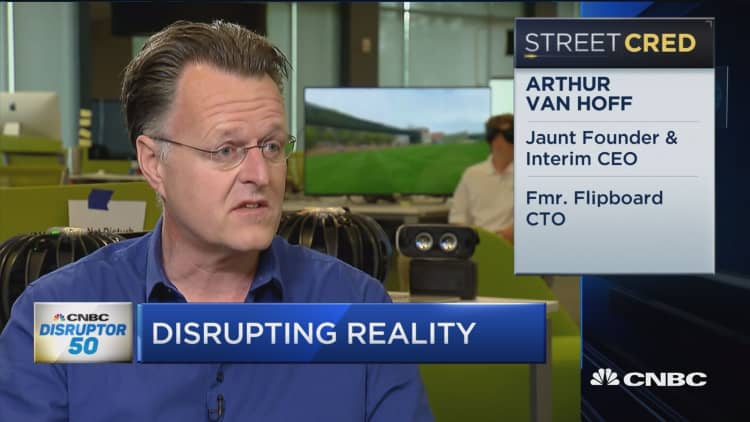Sony's taking pains not to compare the launch of PlayStation VR to that of a new video game console, but Andrew House, president and group CEO of Sony Interactive Entertainment, is warning fans that there could be some similar frustrations.
"We have growing confidence that we'll be supply constrained with this product, but we'll do our very best to meet demand," House said in an exclusive conversation with CNBC.com. "Virtual reality is a medium that's in its infancy. With such a nascent, very new form of storytelling, it's difficult to predict what user uptake is going to be."
It's giving consumers plenty of time to board the VR hype train, though. PlayStation VR will go on sale Oct. 13 for $399, a notably lower price point than the Oculus Rift or HTC Vive (both of which are PC-centric VR headsets). Beyond the price, there's the added advantage of the more than 40 million PlayStation 4 owners, who don't have to worry about whether their system will be powerful enough to run VR. (All PS4s are compatible with the headset.)
"We're obviously very excited about the overall future potential for virtual reality and we think it's the right opportunity to start to build a market," says House. "But we need to keep reminding ourselves that you're requiring a very different user engagement than we have seen previously. … The experiences we are delivering are truly transformative for gaming and that will inspire a certain audience. How large that audience is remains to be seen."
To win that audience, Sony is working with both independent developers to create new intellectual properties and existing partners to bring known franchises – like "Final Fantasy" and the "Batman: Arkham" — games to PlayStation VR.
While VR largely lends itself more to short form experiences right now, Sony's also experimenting with longer form games, like "Farpoint," an atmospheric shooter set on a distant planet.
"Because the sense of immersion is so impactful, even simple game concepts become more powerful and magical than they would be in a traditional TV game experience, says House. "What that does is rewrite the rules a little – and levels the playing field between large teams and small teams."
PlayStation VR titles, he says, will generally range in price from $20-$40, though there will be some games at higher and lower price points.
VR's not the only hardware the PlayStation division is working on these days. Before E3 (the video game industry's annual trade show) began, the company confirmed rumors about a new, more powerful PlayStation 4 code-named Neo.
Given Monday's announcement from Microsoft about a significantly more powerful, seemingly next generation system code named Project Scorpio, questions have arisen about what Sony has in mind with this update.

House, though, says Neo is not the beginning of the next generation.
"It's a higher end version of the PlayStation 4," he says. "We will absolutely have a single community of players. All of the games releasing within this life cycle [of consoles] will absolutely be playable on the standard PS4 … This just offers the consumer another option. If you are looking for the highest graphics performance, if you recent bought a 4K TV and you're looking for content, then Neo is going to be great option for you. But it is that – an option – rather than saying the cycle has moved on."
House declined to discuss whether Neo would be coming out this year or next. However, he said, it's important that the large (and still growing) PS4 user base feel neither rushed, nor that the pace of improvement was too slow.
"People invest in a console and they want to have that investment validated over a decent period of time," he said. "That being said, with iterations like Neo we are, to some degree as an industry, acknowledging the pace of iteration has shifted. … People have become attuned to a slightly different cadence of innovation. The critical thing is to give the consumer options, rather than dictate the future for them."

